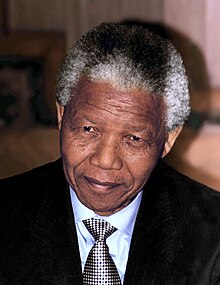The Greatest Man Ever Lived
 Mandela in 1994
Mandela in 1994
1st President of South AfricaIn office
- 10 May 1994 – 14 June 1999DeputyFrederik Willem de Klerk
- (1994–1996)
- Thabo Mbeki
- (1994–1999)
Preceded byFrederik Willem de Klerk (as State President)Succeeded byThabo Mbeki19th Secretary-General of the Non-Aligned MovementIn office
2 September 1998 – 14 June 1999Preceded byAndrés Pastrana ArangoSucceeded byThabo
- affiliationsSouth African Communist
Nelson Rolihlahla Mandela (/mænˈdɛlə/ man-DEH-lə;[1] Xhosa: [xolíɬaɬa mandɛ̂ːla]; born Rolihlahla Mandela; 18 July 1918 – 5 December 2013) was a South African anti-apartheid activist, politician, and statesman who served as the first president of South Africa from 1994 to 1999. He was the country's first black head of state and the first elected in a fully representative democratic election. His government focused on dismantling the legacy of apartheid by fostering racial reconciliation. Ideologically an African nationalist and socialist, he served as the president of the African National Congress (ANC) party from 1991 to 1997.
The Greatest Man Ever Lived: A Tribute to Nelson Mandela
A Life of Activism and Resistance
Born on July 18, 1918, in the village of Mvezo in Umtata, then part of South Africa’s Cape Province, Nelson Rolihlahla Mandela grew up in a country steeped in racial segregation and injustice. The son of a chief and a teacher, Mandela was exposed to the principles of leadership and justice from an early age. His experiences in South Africa’s oppressive apartheid system galvanized him to fight for equality and human rights.
Mandela’s activism began in earnest while he was studying in Johannesburg, where he joined the African National Congress (ANC) and became a prominent leader in the fight against apartheid. His commitment to nonviolent resistance, inspired by Mahatma Gandhi’s principles, initially guided his actions. However, as the regime's brutality escalated, Mandela embraced more radical measures to combat the oppressive system.
Imprisonment and Unyielding Spirit
During his imprisonment, Mandela became a global icon of the struggle against racial injustice. International campaigns and sanctions against South Africa intensified, reflecting global solidarity with his cause. His release in 1990, after decades of relentless struggle and international pressure, marked a turning point in South African history.
The Architect of Reconciliation
Mandela's policies focused on addressing the socioeconomic disparities caused by apartheid and promoting national unity. His efforts in establishing the Truth and Reconciliation Commission were pivotal in confronting the atrocities of the past while fostering a spirit of forgiveness and moving forward together.
A Legacy of Inspiration
Mandela’s impact is also reflected in his numerous awards and accolades, including the Nobel Peace Prize, which he shared with then-South African President F.W. de Klerk in 1993. His influence reaches into various aspects of global society, from politics to education, where his teachings encourage the pursuit of equality and justice.
Conclusion
While the title of "the greatest man ever lived" is subjective and open to interpretation, Nelson Mandela’s life exemplifies the virtues of leadership, resilience, and moral courage. His contributions to the struggle against apartheid, his commitment to reconciliation, and his enduring legacy make him a towering figure in the history of human rights and social justice. As we reflect on Mandela’s extraordinary life, we are reminded of the power of individuals to effect meaningful change and inspire others to follow in their footsteps.























![[ℕ𝕖𝕧𝕖𝕣] 𝕊𝕖𝕝𝕝 𝕐𝕠𝕦𝕣 𝔹𝕚𝕥𝕔𝕠𝕚𝕟 - And Now What.... Pray To The God Of Hopium?](https://cdn.bulbapp.io/frontend/images/79e7827b-c644-4853-b048-a9601a8a8da7/1)


























